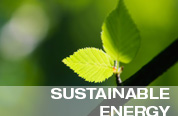


Green Building
Fuel Cells
A fuel cell converts the chemical energy from fuel into electricity through a chemical reaction. Fuel cells are similar to batteries but never run out or require recharging as long as a constant source of fuel and oxygen is supplied. In addition to electricity, fuel cells produce water, heat and depending on the fuel source, very small amounts of nitrogen dioxide and other emissions. The energy efficiency of a fuel cell is generally between 40-60%, or up to 85% efficient if waste heat is captured for use. There are many different types of fuel cells, each with varying efficiency and emissions.
Fuel cells can be used in conjunction with cogeneration capturing waste heat, increasing efficiency even further.
In the case where fuel cells have been used in power plant's emissions can be so low that some areas have exempted fuel cells from air permit requirements. Fuel cells are also very quiet, which reduces noise pollution. Based on measured data, a fuel cell power plant may create less than one ounce of pollution per 1,000 kilowatt-hours of electricity produced - compared to the 25 pounds of pollutants for conventional combustion generating systems.
In the right situation and with proper installation, fuels cells can have a payback of 3-5 years. There is an investment tax credit available of 30% for qualified fuel cell property or $3,000/kW of the fuel cell nameplate capacity (i.e., expected system output), whichever is less.
©2020 Controlled Air, Inc. Branford, CT . 203-481-3531 . controlledair@controlledair.com . Lic # CT S1 302788 / RI R/M1 & P/M 00007776